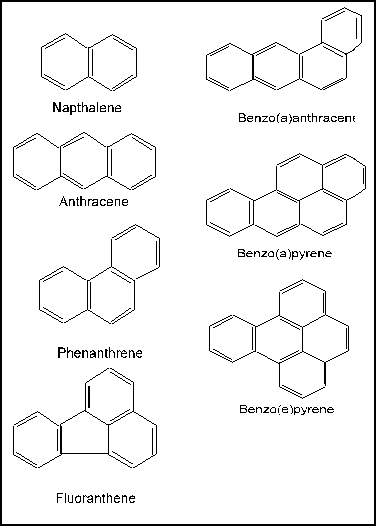 | ||||||
| Articles | Projects | Resume | Cartoons | Windsurfing | Paintings | Album |
The Determination of Polycyclic Aromatic Hydrocarbons (PAH)
in a Surface Soil Sample from Bamberton Cement Plant
by High Pressure Liquid Chromatography

by Waterose
Abstract:
The concentration of Polycyclic Aromatic Hydrocarbons (PAH’s) in the homogenised surface soil sample obtained adjacent to the fuel storage tanks at Bamberton Cement Manufacturing Plant, which was closed in 1980, was inconclusive. There were minute traces of benzo(a)pyrene of 1.60 ppm and 0.57 ppm. There were traces of dibenz(a,h)anthracene of 2.11 ppm. There were traces of benzo(ghi) perylene of 1.30 ppm. The sample was prepared by solid phase extraction technique and analysed with a Waters High Pressure Liquid Chromatography (HPLC) System, with Waters UV/Fluorescence detectors. The sample was tested against an EPA standard mixture of 16 PAH’s. A third sample did not contain any traces of PAH substances.
Key Words:
Polycyclic aromatic hydrocarbons, PAH’s, Benzo(a)pyrene, Dibenz(a,h)anthracene, Benzo(ghi)perylene, surface soil sample, Bamberton Cement Plant, Solid Phase Extraction
Introduction:
Polycyclic Aromatic Hydrocarbons (PAH’s) are a group of hydrocarbons that contain two or more aromatic hydrocarbon rings that are joined together. PAH’s are a common constituent of fuels and lubricating oils. PAH’s strongly adsorb to soil particles, some are known carcinogens, and light PAH’s bioaccumulate more easily than heavy PAH’s. Some PAH’s are highly volatile; those with less fused rings will volatise more easily and biodegrade more quickly (Manahan, 1994).Some common examples of PAH’s are illustrated below in Figure 1.

The objectives were to compare the HPLC analysis results for duplicate samples of one homogenised surface soil sample obtained adjacent to fuel storage tanks at the Bamberton Cement Manufacturing plant.
To Section 2. Methods:
Index:

 email Waterose
email Waterose
Please Sign My Guestbook
Please View My Guestbook

| Articles | Projects | Resume | Cartoons | Windsurfing | Paintings | Album |
 | ||||||